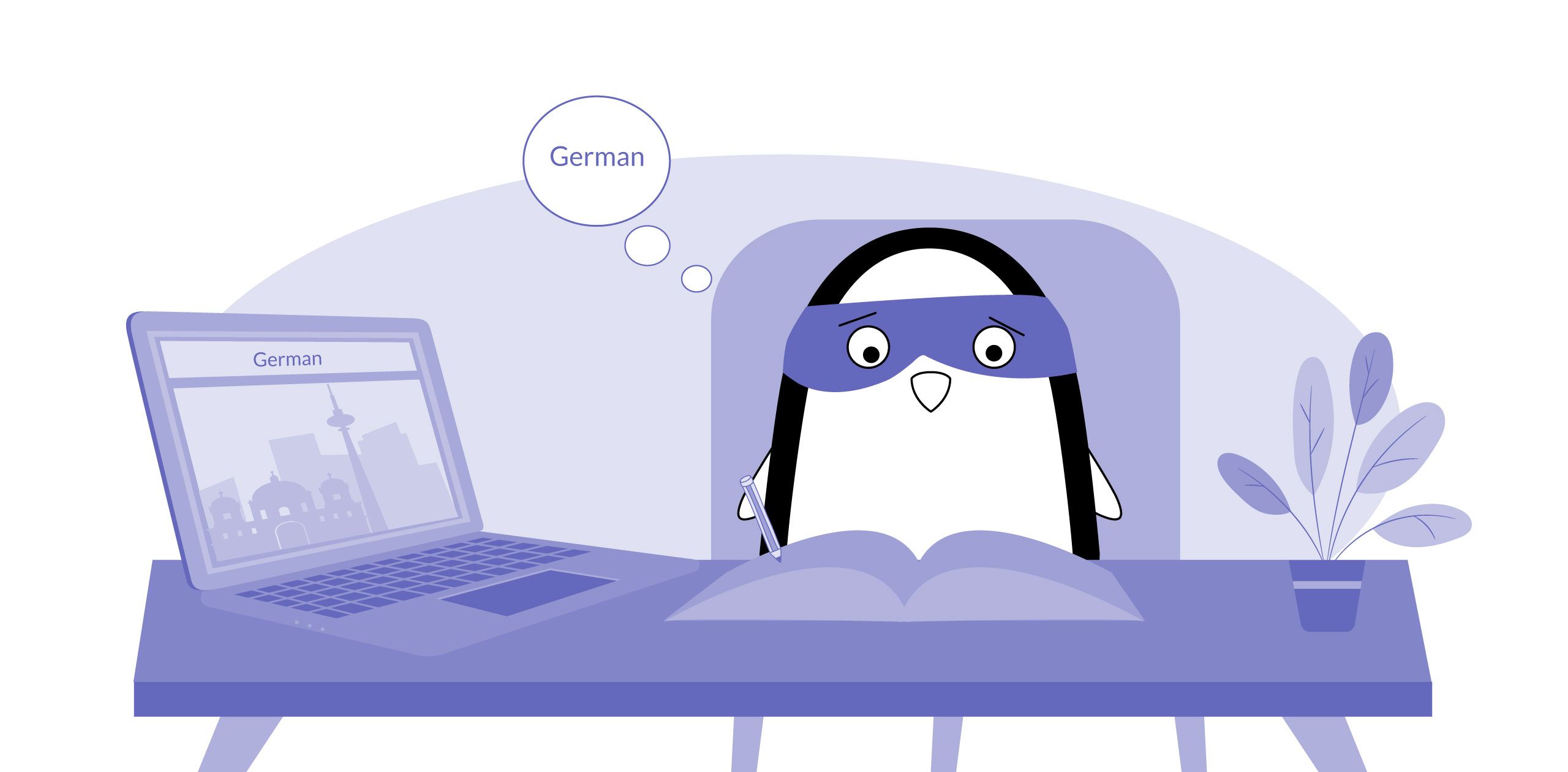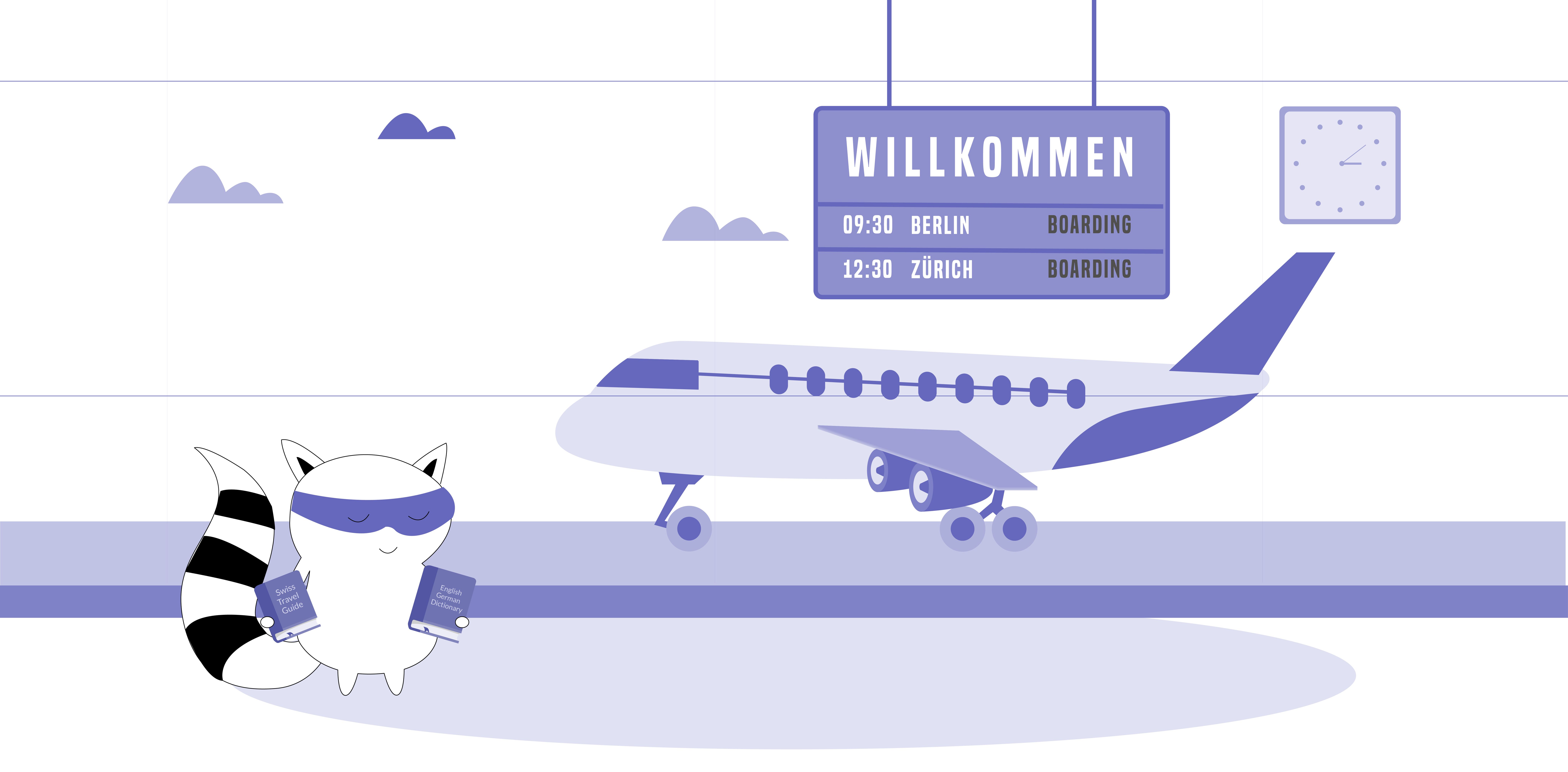
Switzerland, known for its linguistic diversity, offers a myriad of opportunities for language learning and testing. Particularly for those looking to hone their German skills, the country provides several comprehensive exams catering to a range of proficiency levels.
The ability to speak German can significantly enhance your experiences since it’s one of the four official languages of Switzerland, making it a vital skill for anyone wishing to live, work, or study in the country. Additionally, many institutions, from universities to employers, require a certain level of German proficiency.
Thus, taking a German language test in Switzerland is an excellent step towards demonstrating your language capabilities and increasing your prospects in this multilingual country. This guide will help you navigate the different German language exams available in Switzerland — from FIDE to telc Deutsch — and provide crucial information to help you prepare.
Learn German with Langster
When Do You Need a Swiss Language Certification?
Swiss language certifications are required in various situations, particularly those involving immigration, employment, or education.
For instance, anyone applying for a long-term residence permit in Switzerland must demonstrate a basic proficiency in one of the nation's official languages — German, French, Italian, or Romansh.
Similarly, if you're seeking Swiss citizenship, you're required to meet a basic standard of both written and spoken communication in the language predominant in your canton.
Educational institutions in Switzerland may also demand proof of your language proficiency if you're applying for a study program.
The same goes for job applications, where potential employers, including international companies, may require evidence of your German language skills. This is particularly true if your work contract specifies that the role would be conducted in one of the country’s national languages.
Thus, having a Swiss language certification can open up numerous opportunities and make your transition to Switzerland smoother.
Types of German Exams Available in Switzerland
Switzerland offers a range of exams for testing your German language skills, each catering to various proficiency levels and serving different purposes.
Let's take a look at some of the most popular options:
Fide Language Passport
The Fide language passport is the recognized language proficiency validation system in Switzerland, covering three of the national languages: German, French, and Italian. This test assesses your speaking, listening, reading, and writing capabilities in accordance with the Common European Framework of Reference for Languages (CEFR) A1-B1 levels.
The Fide language passport serves as proof for naturalization, residence permit (B), and settlement permit (C).
This exam was developed under the auspices of the State Secretariat for Migration (SEM) and is designed to evaluate your linguistic abilities in everyday Swiss situations, like professional environments, medical appointments, or interactions with local municipal authorities.
The Fide test is open to candidates over the age of 16, with special provisions in place for individuals with disabilities.
The Fide test is divided into two sections:
- an oral part (“speaking & comprehension”), approx. 40 minutes long.
- a written part (“reading & writing”), approx. 60 minutes long.
To register for the Fide test, you can directly contact an examination institution — from those located in Basel to ones in Zürich — on the test’s official website, ensuring to do so at least 15 days prior to the desired examination date.
The cost for the complete test is CHF 250. Depending on your needs, you can choose whether you want to complete the entire Fide test or only one of the two parts. If you opt to take only the oral or written part, the cost would be CHF 170 and CHF 120, respectively.
After completing the test, you can expect to receive your Fide language passport and the test results by post approx. 4 weeks later. Please note that during the period from mid-December to mid-January, it might take up to six weeks to issue the language passport.
To prepare for the Fide test, you can download the model test or register for a mock exam — again on the website.
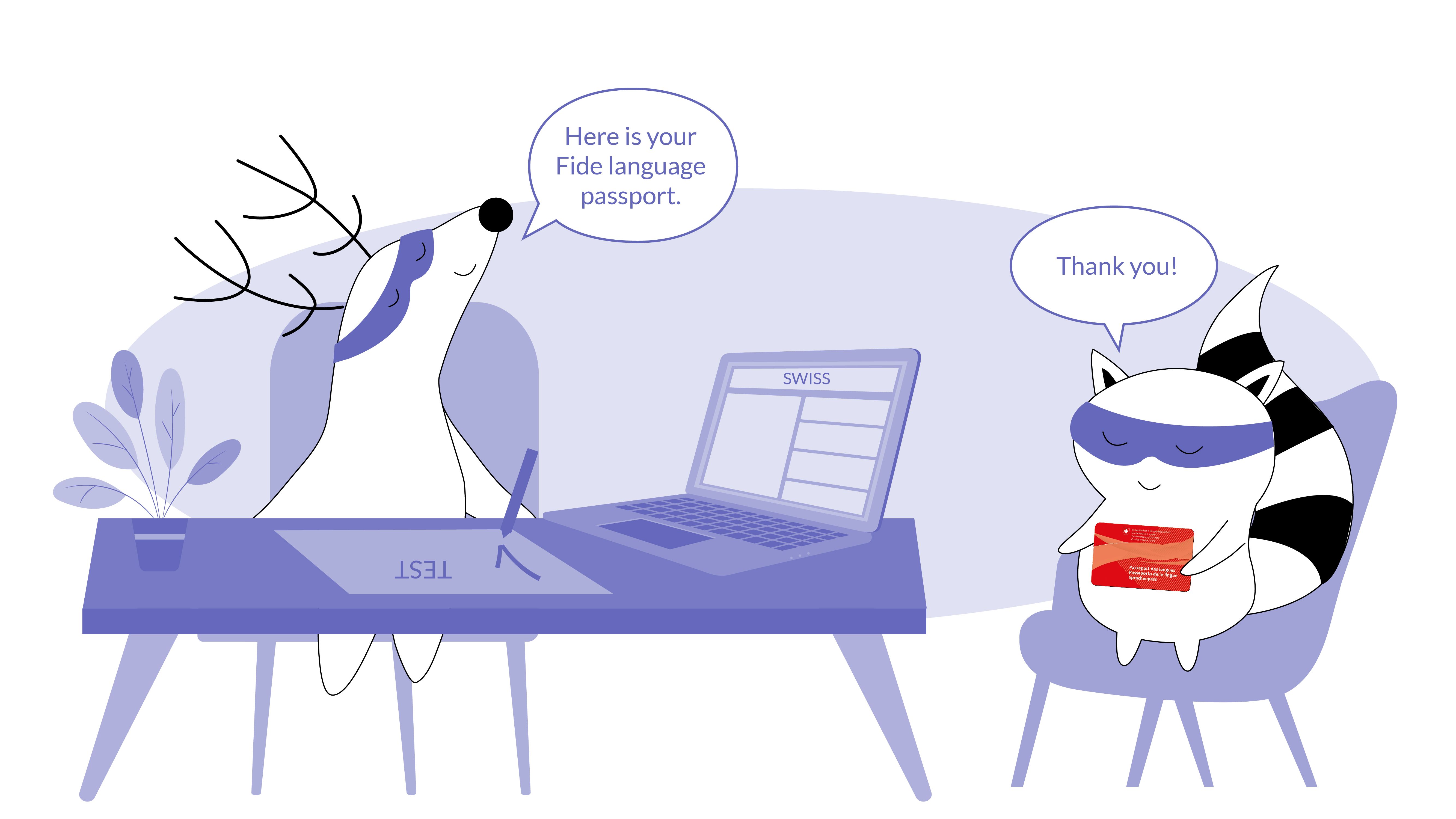
Now, if you’re familiar with our guide on taking a German test in Germany, the following options will already be known to you. So, here is a quick recap of A1-B1 Prüfung zur Verfügung — testing available — to choose from:
Goethe-Institut
The Goethe-Institut is a renowned global organization with 159 institutions worldwide, promoting the German language and German forms of learning to the world. Their tests and official certifications for German proficiency are globally recognized, including by Swiss authorities — German language exams by Goethe-Institut are also recognized by Fide!
To register for a Goethe-Institut test, you can visit the official website or the website of an examination cooperation partner, select your preferred test center, and choose from the dates available. The registration process and requirements may vary depending on the test center, so be sure to check the specific details.
The cost for the exams can vary depending on the level, but you can expect it to be around €95 to €260.
Once you pass the test, you will receive an internationally recognized certificate proving your German proficiency. This certificate is valid indefinitely, making it a valuable asset for your educational or career pursuits in Switzerland or any German-speaking country.
To prepare for the Goethe-Institut German test, you can access a variety of resources, including practice materials, online exercises, and sample exams on their official website. You can also consider taking a preparation course offered by the Goethe-Institut to effectively study for the test.
Other German Tests in Switzerland
In addition to these two main German test providers, there are several other German language certifiers in Switzerland that may suit your needs based on your proficiency level and specific circumstances.
AFU Language Centre
The AFU Language Centre offers German language tests ranging from A2 to C1. The center is known for its professional approach and comprehensive testing system, which assesses listening, speaking, reading, and writing skills.
In addition to the tests, the AFU Language Centre also offers language courses to help students prepare for the exams.
Bildungszentrum Interlaken
Bildungszentrum Interlaken offers German language tests for A2 to C1 levels. Known for its experienced teachers and rigorous testing standards, Bildungszentrum Interlaken is a reliable choice for anyone wishing to certify their German language skills.
Gemeindeamt Zürich
Gemeindeamt Zürich offers German language tests specifically for A2 and B1 levels. This certification can be particularly suitable for those seeking employment or long-term residence in Zurich.
Social Development GmbH
Social Development GmbH provides German language tests from A1 to B2 levels. Their tests are designed to measure practical language skills that are applicable to a wide range of daily and professional situations.
Telc GmbH
Telc GmbH offers a wide range of German language tests and examination centers across Switzerland, covering levels from A1 to C1.
Recognized internationally, Telc Deutsch exams are a reliable way to prove your German language proficiency for academic, personal, or professional purposes.
TestDaF
The TestDaF Institute offers German language tests for B2 to C1 levels. Although administered in Germany, it is recognized by Swiss universities and employers, especially in academic and scientific areas, making it an excellent choice for students planning to study in German-speaking countries.
Remember to check the specific requirements, registration process, and fees for each exam provider by visiting their respective websites.
DSH (Deutsche Sprachprüfung für den Hochschulzugang)
DSH is a language proficiency test required for entry to a German university and to undertake all classes in the German language. It is not as internationally recognized as the Goethe-Institut exams or TestDaF, but it is highly prestigious within German-speaking countries.
It demands a high level of proficiency (C1 or C2 level), making it most suitable for advanced learners.
How to Choose the Right Test
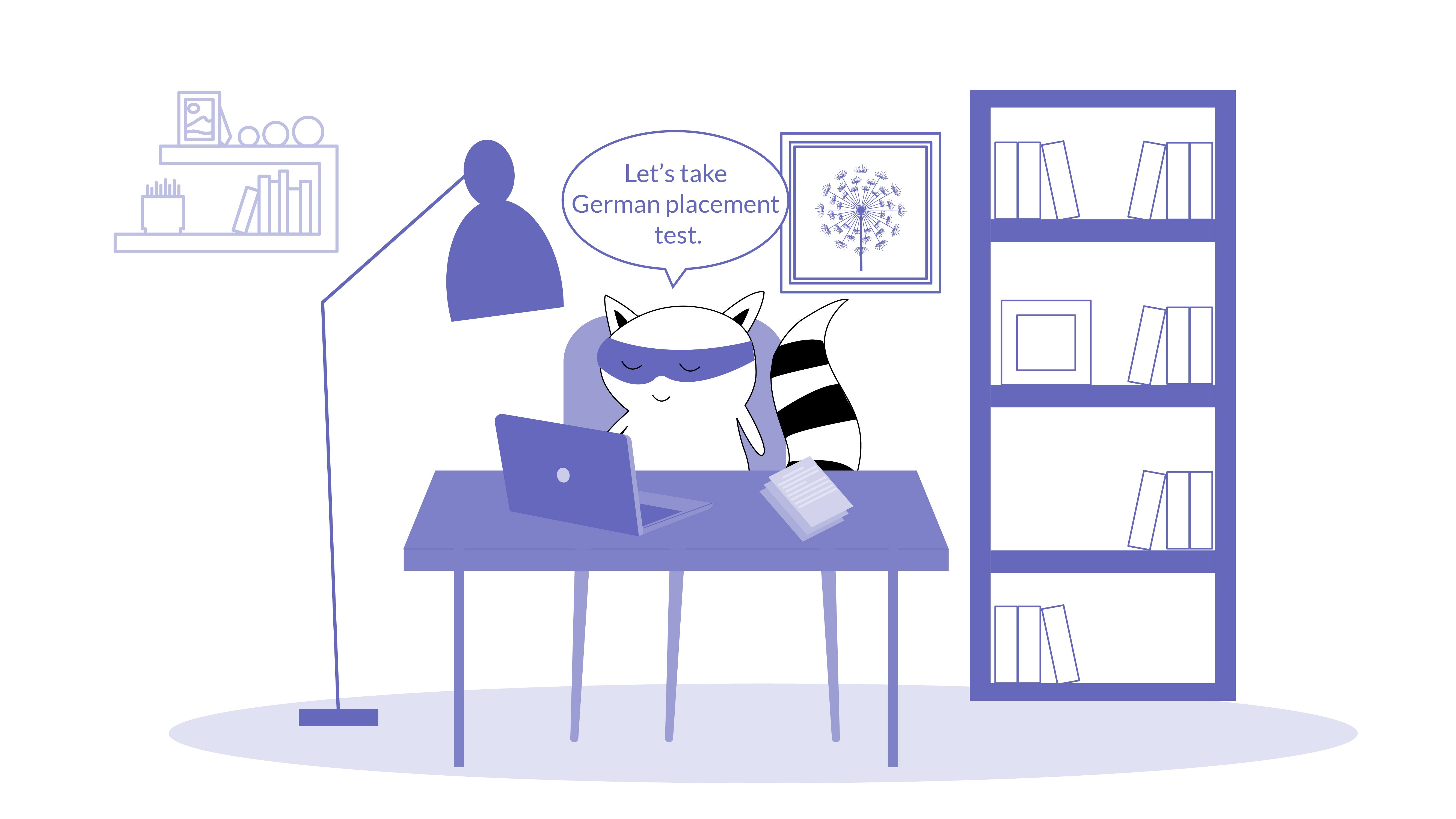
Before registering for a German language test in Switzerland, it's crucial to determine which exam best fits your needs. Here are a few quick guidelines to follow:
- Consider the purpose of taking the test, such as immigration requirements, university applications, or employment opportunities.
- Think about whether you need a certification recognized only in Switzerland or worldwide.
- Assess your current proficiency level and choose an exam that is appropriate for your skills. Taking a placement test or consulting with a language expert can help you determine which test aligns with your current abilities.
- Consider the format of the exam as well. Some tests may be solely written, while others include an oral component. Choose the one that best fits your strengths and learning style.
- Take into account the cost and location of the exam. Some tests may be more expensive, but they also offer more comprehensive evaluations. Additionally, consider the convenience of the test center's location in relation to where you live or work.
With these factors in mind, you can make an informed decision on which German language test is right for you. Remember that each certification has its benefits and recognition, so choose the one that will serve your goals best.
Understanding the Test Formats
The format of German language tests varies based on the test provider and the level of the exam. Generally, these tests are divided into four sections:
Listening
In this section, you'll listen to dialogues or monologues in German and answer questions related to them. The content can range from everyday conversations to news reports or presentations.
To excel in this section, practice active listening by consuming a variety of German audio materials. This could include podcasts, news, audiobooks, or language-learning apps, such as our Langster app that allows you to learn German with stories and provides audio from native German speakers.
Reading
The reading section is designed to test your ability to understand written German. You may be given texts, such as articles, advertisements, or emails, and asked to answer questions related to the content.
Improve your reading comprehension skills by regularly reading German literature, newspapers, or online articles. Make it a habit to highlight unfamiliar words and phrases and look them up in a German-English dictionary.
Writing
The writing section assesses your ability to express your thoughts in written German. This could involve writing an essay, a letter, or an article on a given topic.
To prepare for this section, practice writing in German daily. You could write about your day, review a book or a movie, or express your opinion on a certain topic. Also, invest time in learning and practicing German grammar and vocabulary.
Speaking
The speaking section measures your ability to communicate in German verbally. This could involve having a conversation with an examiner, giving a presentation, or discussing a topic.
To improve your speaking skills, engage in regular conversation with native German speakers. You could also practice speaking aloud by narrating your daily activities in German.
Remember, although the overall structure is typically the same, each test provider may have slightly different formats and requirements for each section, so it's crucial to familiarize yourself with the specifics of the test you choose.
It’s a good practice to check the test provider's official website for sample tests and practice materials to get a clearer understanding of what to expect on the test day.
Test Locations
![PLACEHOLDER] Iggy, Soren, Pocky, and Benji are placed on the map of Switzerland, taking tests, each in a different city — Zürich, Bern, Basel, and Lucerne.](https://cdn.sanity.io/images/leeoh1ke/production/78140e8cb6a9e2b1779896136cb93cca2aa48eb8-5333x3000.jpg?fit=max)
German language tests can be taken in various cities across Switzerland. Here are some options to consider:
- Zürich. Home to Gemeindeamt Zürich and many other language schools, Zürich is a hub for German language learning and testing. It is a convenient location for those living in or near the city.
- Bern. As the capital city of Switzerland, Bern also hosts several locations where German language tests can be conducted.
- Geneva. Despite being primarily French-speaking, Geneva provides German language test facilities for those living in the western region of Switzerland.
- Basel. Located near the German border, Basel is a great location for German language tests, especially for those residing in the northern part of Switzerland.
- Lucerne. Lucerne is another location that offers German language tests. It's a suitable option for those living in the central region of Switzerland.
When choosing a location, consider factors such as the distance from your home or workplace and the availability and frequency of the tests. It may be more convenient to choose a location closer to you, especially if you have a tight schedule.
Some testing centers may offer more frequent test dates than others, providing flexibility and convenience. However, also consider the reputation and reliability of the testing center. Be sure to check reviews or ask for recommendations to ensure you choose a reputable test location.
Test Fees
The cost of German language tests in Switzerland varies depending on the type of test and the level of certification you're aiming for.
On average, you can expect to pay anywhere from CHF 200 to CHF 400. However, keep in mind that these fees are subject to change and may vary depending on the test provider.
For instance, Goethe-Institut exams range from CHF 130 for the A1 level to CHF 335 for the C2 level, including the cost of the exam and the issuing of the certificate. On the other hand, telc exam fees range from CHF 160 for the A1 level to CHF 390 for the C2 level, with additional certification costs included.
Still, the fees mentioned above are the base fees and do not include additional costs like late registration or rescheduling. Late registration fees could add an extra CHF 50 to CHF 100 to your total cost, while rescheduling could cost you approximately CHF 60, depending on the test provider.
It's also important to check if the test fee includes any preparatory materials or if these need to be purchased separately.
Before registering for a test, make sure to fully understand the fee structure and any additional costs so that you can budget accordingly. If you're unsure, contact the test provider or the testing center directly for more accurate and up-to-date information.
Test Preparation Tips
Proper preparation is the key to performing well on any language test. Here are some strategies and resources that can aid you in your study journey:
- Timely study. Begin preparing for your test several weeks or even months in advance. This allows ample time to strengthen your language skills, learn new vocabulary, and familiarize yourself with the test format.
- Practice tests. Practice tests are an invaluable resource for preparation. They provide insight into the types of questions you'll encounter and can help determine the areas where you need to focus. Fortunately, most test providers offer sample tests on their official websites.
- Language learning apps. Apps like Duolingo, Memrise, Babbel, and Langster offer German lessons that can help reinforce your learning.
- German media. Immerse yourself in the German language by consuming German media. Watch German movies or TV shows, listen to German podcasts or radio stations, and read German books and newspapers.
- Language exchange. Engage in conversation with native German speakers. Language exchange platforms such as Tandem or HelloTalk can be useful for this.
When test day arrives, bring your identification, your test confirmation, and any other materials specified by your test center. Also, bring a water bottle and light snacks to keep you energized and hydrated.
After the test, you will receive your results from the testing center or through the test provider's website. Results typically include a score for each section and an overall score. Some tests may also provide feedback on areas of strength and areas for improvement.
Understanding your results can help you identify how to improve your German language proficiency for future tests or for practical use.
The Bottom Line
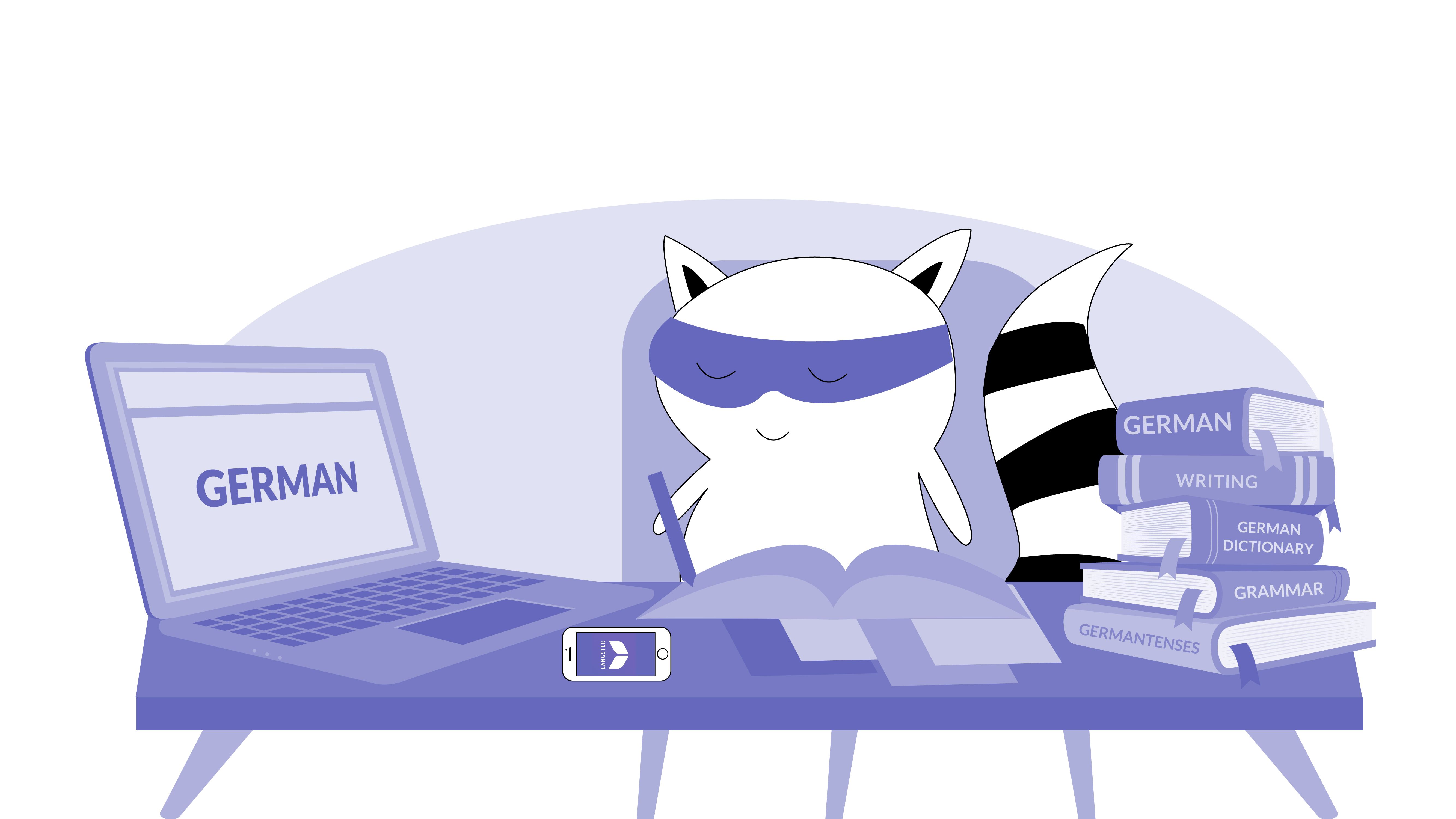
Taking a German language test in Switzerland is a well-structured process with multiple options to suit varying needs. From choosing the right test and location to understanding fees and effective preparation strategies, each step brings you closer to certifying your German language proficiency.
While the preparation journey may seem daunting, remember that every step you take is an opportunity to grow and learn. Use the resources available, practice consistently, and approach the test with confidence.
Whether your goal is personal enrichment, academic advancement, or professional development, mastering the German language opens up a world of opportunities in Switzerland and beyond. Good luck with your preparations and on your test day!
Learn German with Langster







